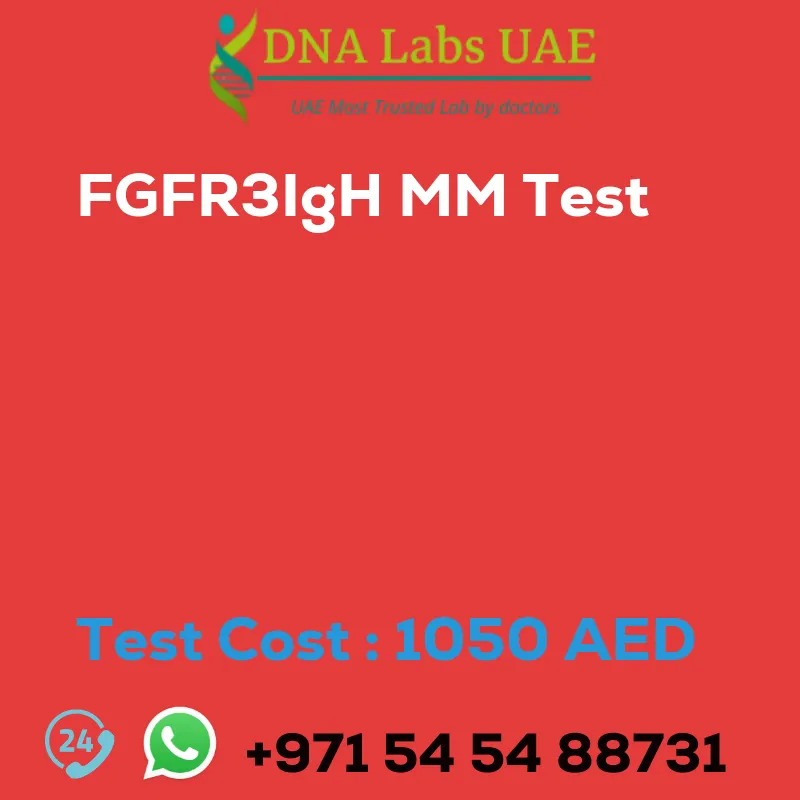FGFR3IgH MM Test
Test Name: FGFR3IgH MM Test
Components: Sodium Heparin Vacutainer (2ml)
Price: 1050.0 AED
Sample Condition: Bone Marrow / Peripheral blood
Report Delivery: 3-4 days
Method: FISH
Test Type: Genetics
Doctor: Oncology
Test Department:
Pre Test Information: FGFR3/IgH (MM) can be done with a Doctors prescription. Prescription is not applicable for surgery and pregnancy cases or people planning to travel abroad.
Test Details:
FGFR3/IgH (MM) refers to a chromosomal translocation that is commonly found in a subtype of multiple myeloma (MM) called t(4;14)(p16;q32). This translocation involves the fusion of the FGFR3 (fibroblast growth factor receptor 3) gene on chromosome 4 with the IgH (immunoglobulin heavy chain) gene on chromosome 14. The FGFR3/IgH fusion gene results in the overexpression of FGFR3, a receptor tyrosine kinase involved in cell growth and differentiation. This dysregulated expression of FGFR3 contributes to the development and progression of multiple myeloma.
Patients with FGFR3/IgH translocation in their multiple myeloma have been found to have distinct clinical and biological characteristics. They tend to have a more aggressive disease course, higher tumor burden, and poorer prognosis compared to other subtypes of multiple myeloma. Understanding the presence of FGFR3/IgH translocation in multiple myeloma patients can be important for risk stratification and treatment planning. Targeted therapies that specifically inhibit FGFR3 signaling may be considered as a treatment option for these patients.
| Test Name | FGFR3IgH MM Test |
|---|---|
| Components | Sodium Heparin Vacutainer (2ml) |
| Price | 1050.0 AED |
| Sample Condition | Bone Marrow \/ Peripheral blood |
| Report Delivery | 3-4 days |
| Method | FISH |
| Test type | Genetics |
| Doctor | Oncology |
| Test Department: | |
| Pre Test Information | FGFR3/IgH (MM) can be done with a Doctors prescription. Prescription is not applicable for surgery and pregnancy cases or people planing to travel abroad. |
| Test Details |
FGFR3/IgH (MM) refers to a chromosomal translocation that is commonly found in a subtype of multiple myeloma (MM) called t(4;14)(p16;q32). This translocation involves the fusion of the FGFR3 (fibroblast growth factor receptor 3) gene on chromosome 4 with the IgH (immunoglobulin heavy chain) gene on chromosome 14. The FGFR3/IgH fusion gene results in the overexpression of FGFR3, a receptor tyrosine kinase involved in cell growth and differentiation. This dysregulated expression of FGFR3 contributes to the development and progression of multiple myeloma. Patients with FGFR3/IgH translocation in their multiple myeloma have been found to have distinct clinical and biological characteristics. They tend to have a more aggressive disease course, higher tumor burden, and poorer prognosis compared to other subtypes of multiple myeloma. Understanding the presence of FGFR3/IgH translocation in multiple myeloma patients can be important for risk stratification and treatment planning. Targeted therapies that specifically inhibit FGFR3 signaling may be considered as a treatment option for these patients. |








